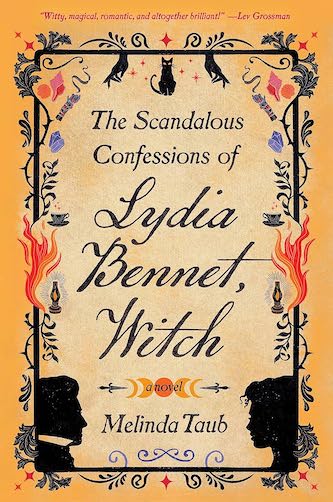Book Review: “The Scandalous Confessions of Lydia Bennet, Witch” — Jane Austen, Bedeviled
By Clea Simon
Melinda Taub’s thoroughly enjoyable new novel joins other notable pastiches of Jane Austen’s classic story.
The Scandalous Confessions of Lydia Bennet, Witch by Melinda Taub. Grand Central, 400 pp., $30
 How could Lydia Bennet be so selfish, so stupid, so … well, careless? These are the questions we fans of Jane Austen’s Pride and Prejudice have asked ourselves for more than a century. Since the 1813 romance/novel of manners was published, readers have marveled at how the youngest Bennet sister could run off with that rake Wickham, destroying her own good name and also threatening her siblings’ prospects. Now, cynics may quibble that Lydia’s escapades serve the plot — drawing out the notoriously taciturn hero Darcy’s ability to overlook convention and his own pride in his love for the book’s heroine, Lizzy — but what kind of answer is that? Much better to believe that little Lydia had reasons of her own. Reasons such as that she is a witch and Wickham is a demon, and that by taking off with him the 15-year-old is not only saving her family but England — and perhaps the world — as we know it.
How could Lydia Bennet be so selfish, so stupid, so … well, careless? These are the questions we fans of Jane Austen’s Pride and Prejudice have asked ourselves for more than a century. Since the 1813 romance/novel of manners was published, readers have marveled at how the youngest Bennet sister could run off with that rake Wickham, destroying her own good name and also threatening her siblings’ prospects. Now, cynics may quibble that Lydia’s escapades serve the plot — drawing out the notoriously taciturn hero Darcy’s ability to overlook convention and his own pride in his love for the book’s heroine, Lizzy — but what kind of answer is that? Much better to believe that little Lydia had reasons of her own. Reasons such as that she is a witch and Wickham is a demon, and that by taking off with him the 15-year-old is not only saving her family but England — and perhaps the world — as we know it.
That’s the premise behind the thoroughly enjoyable The Scandalous Confessions of Lydia Bennet, Witch, a new novel by Melinda Taub, which joins such other notable pastiches as Longbourn (a servant’s view), The Other Bennet Sister (about middle sister Mary), and the ridiculously funny Pride and Prejudice and Zombies, among others. This romp begins with a reasonable assumption: Lydia, the youngest of the Bennet girls, is lonely. Her two oldest surviving siblings, beautiful Jane and witty Lizzy, bond over secrets and dreams. (In a Taub invention, three Bennet girls have died in childhood.) Middle sister Mary has her reading and her constant attempts at self-improvement, and Lydia has … the cat. A gift to her mother, the affectionate tabby has been largely ignored since growing out of cute kittenhood, and so, with her father threatening to get rid of the beast, Lydia does what one does — notably if one is the seventh daughter of a seventh daughter and thus gifted with the craft — and turns the cat into another sister, Kitty. Suddenly, her family is acting as if there has always been another girl in the mix, one slightly older than Lydia and as close to her as Lizzy and Jane are to each other.
As Lydia soon learns, however, magic has a price and promises are binding, even when given by a headstrong young girl. Lydia’s heedlessness — a carryover from the original – has her making an open-ended promise to an unknown being, and she soon comes to learn that this promise threatens those she holds most dear. As the book follows her uneven education — not all witches are created equal and Taub has conceived a crew as varied as any of Austen’s social scenes — she will find herself looking for relief from this promise, or at least some way to counter its deadly consequences.
Along the way, Lydia will attend dances, buy ribbons, and just generally enjoy herself both among the landed gentry and the troops that are routinely billeted nearby, as she does in the original. But there’s a new subtext, which the author weaves in adroitly. As well versed in English folklore as she is in Austen, Taub gives us spells cast in salt and knotted ribbons, cameo appearances by the Long Man of Wilmington (who seems to have taken on a bit of the Green Man’s myth), and at least one ancient dragon, as well as references to other Austen works (including the unfinished Sanditon) in her bright, period-appropriate prose.
In a considerable departure from the original, Lydia’s memoirs don’t follow a strict timeline. The teenage witch is no logical Lizzy. But Taub’s apparently ramshackle structure is not difficult to follow and allows for several cliffhangers as well as explanations for both why this “confession” was written and why it has not been seen until now. Intricately plotted, this The Scandalous Confessions contains all the action in the Austen original. And if Lizzy, the original heroine of Pride and Prejudice, comes across as a little less sharp than in the original? Well, that’s just because, compared to her little sister, she has so much less to deal with.
Clea Simon’s latest novel is To Conjure a Killer, a Witch Cats of Cambridge mystery (Polis Books).
